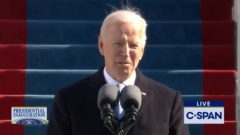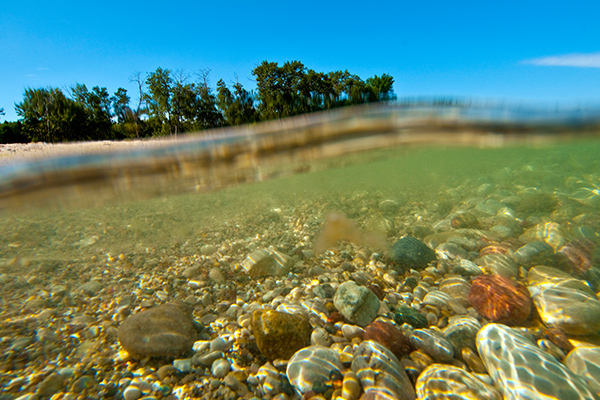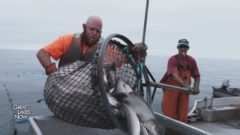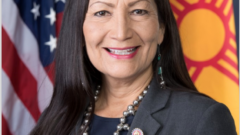New Channel: Great Lakes Now anchors Saturday evenings on Michigan Learning Channel

Even the youngest Great Lakes fans can learn more about the world’s largest surface freshwater system – and they can do it while watching educational television.
The Michigan Learning Channel launched statewide earlier this month as a new distance-learning initiative. All six Michigan PBS stations are involved in the channel, with Detroit Public Television leading the effort.
Great Lakes Now
https://www.greatlakesnow.org/2021/01/great-lakes-now-saturday-evenings-michigan-learning-channel/




 For Becky Sapper, the waters of Lake Superior are her lodestar; she has lived near them for 25 years. Based in Ashland, she directs the Wisconsin Master Naturalist Program, which in 2020 was honored with the Dave Engleson Award from the Wisconsin Association for Environmental Education. That award recognizes significant contributions to the field of environmental education having statewide, regional or national impact.
For Becky Sapper, the waters of Lake Superior are her lodestar; she has lived near them for 25 years. Based in Ashland, she directs the Wisconsin Master Naturalist Program, which in 2020 was honored with the Dave Engleson Award from the Wisconsin Association for Environmental Education. That award recognizes significant contributions to the field of environmental education having statewide, regional or national impact.


 As the nation faces unprecedented challenges, clean water is more important than ever. The deepening COVID-19 crisis reminds us daily of the deep connection between clean water and public health. Investments in clean water programs support getting people back to work and protect public health, a win for everyone.
As the nation faces unprecedented challenges, clean water is more important than ever. The deepening COVID-19 crisis reminds us daily of the deep connection between clean water and public health. Investments in clean water programs support getting people back to work and protect public health, a win for everyone. Low-income communities and communities of color are disproportionately impacted by pollution. Environmental justice seeks to address this unfair distribution of pollution and repair the harm that it causes. It requires the fair treatment and meaningful involvement of people of color and low-income communities in the development, implementation, and enforcement of environmental laws, regulations, and policies. The Great Lakes region has the opportunity to lead the way, to show how environmental justice can be achieved. There are specific actions the administration can take to address environmental justice in the Great Lakes region right now.
Low-income communities and communities of color are disproportionately impacted by pollution. Environmental justice seeks to address this unfair distribution of pollution and repair the harm that it causes. It requires the fair treatment and meaningful involvement of people of color and low-income communities in the development, implementation, and enforcement of environmental laws, regulations, and policies. The Great Lakes region has the opportunity to lead the way, to show how environmental justice can be achieved. There are specific actions the administration can take to address environmental justice in the Great Lakes region right now. Clean water is a basic need. No one should be without clean, safe, affordable water in their home. No one should have to worry about sewage backing up into their basement or community flooding that damages property. Yet, communities across the Great Lakes region continue to grapple with crumbling, antiquated drinking water and wastewater infrastructure. The longer we wait, the harder and more expensive these problems will be to solve.
Clean water is a basic need. No one should be without clean, safe, affordable water in their home. No one should have to worry about sewage backing up into their basement or community flooding that damages property. Yet, communities across the Great Lakes region continue to grapple with crumbling, antiquated drinking water and wastewater infrastructure. The longer we wait, the harder and more expensive these problems will be to solve. The Great Lakes Restoration Initiative (GLRI) provides funding for on-the-ground restoration projects, from wetland restoration to cleaning up toxic hotspots, throughout the Great Lakes region. In addition to improving the Great Lakes ecosystem,
The Great Lakes Restoration Initiative (GLRI) provides funding for on-the-ground restoration projects, from wetland restoration to cleaning up toxic hotspots, throughout the Great Lakes region. In addition to improving the Great Lakes ecosystem,  Invasive Asian Carp pose a clear threat to the Great Lakes. Established populations of these fish are only 50 miles from Chicago and Lake Michigan. But it’s not too late to prevent them from reaching the lakes.
Invasive Asian Carp pose a clear threat to the Great Lakes. Established populations of these fish are only 50 miles from Chicago and Lake Michigan. But it’s not too late to prevent them from reaching the lakes. Nutrient pollution that fuels harmful algal blooms is a significant threat to the region’s drinking water, quality of life, and economic well-being. Runoff from agricultural lands is a significant contributor to the phosphorus pollution that drives these blooms.
Nutrient pollution that fuels harmful algal blooms is a significant threat to the region’s drinking water, quality of life, and economic well-being. Runoff from agricultural lands is a significant contributor to the phosphorus pollution that drives these blooms. As the nation faces unprecedented challenges, clean water is more important than ever. The deepening COVID-19 crisis reminds us daily of the deep connection between clean water and public health. Investment in clean water programs supports getting people back to work and protects public health, a win for everyone.
As the nation faces unprecedented challenges, clean water is more important than ever. The deepening COVID-19 crisis reminds us daily of the deep connection between clean water and public health. Investment in clean water programs supports getting people back to work and protects public health, a win for everyone. Low-income communities and communities of color are disproportionately impacted by pollution. Environmental justice seeks to address this unfair distribution of pollution and repair the harm that it causes. It requires the fair treatment and meaningful involvement of people of color and low-income communities in the development, implementation, and enforcement of environmental laws, regulations, and policies. The Great Lakes region has an opportunity to help lead the way.
Low-income communities and communities of color are disproportionately impacted by pollution. Environmental justice seeks to address this unfair distribution of pollution and repair the harm that it causes. It requires the fair treatment and meaningful involvement of people of color and low-income communities in the development, implementation, and enforcement of environmental laws, regulations, and policies. The Great Lakes region has an opportunity to help lead the way. Clean water is a basic need. No one should be without clean, safe, affordable water in their home. No one should have to worry about sewage backing up into their basement or community flooding that damages property. Yet, communities across the Great Lakes region continue to grapple with crumbling, antiquated drinking water and wastewater infrastructure. The longer we wait, the harder and more expensive these problems will be to solve.
Clean water is a basic need. No one should be without clean, safe, affordable water in their home. No one should have to worry about sewage backing up into their basement or community flooding that damages property. Yet, communities across the Great Lakes region continue to grapple with crumbling, antiquated drinking water and wastewater infrastructure. The longer we wait, the harder and more expensive these problems will be to solve. The Great Lakes Restoration Initiative (GLRI) provides funding for on-the-ground restoration projects, from wetland restoration to cleaning up toxic hotspots, throughout the Great Lakes region. In addition to improving the Great Lakes ecosystem,
The Great Lakes Restoration Initiative (GLRI) provides funding for on-the-ground restoration projects, from wetland restoration to cleaning up toxic hotspots, throughout the Great Lakes region. In addition to improving the Great Lakes ecosystem,  To keep these fish out of the Great Lakes, the U.S. Army Corps of Engineers has proposed the construction of additional invasive Asian Carp measures at the Brandon Road Lock and Dam, located near Joliet, Illinois. After years of study and public debate, this project has been identified as the best step in stopping the fish from entering the Great Lakes and allowing waterborne commerce to continue moving through the lock. The project has wide bipartisan support and is authorized by Congress. To continue efforts to build Asian carp protections at the Brandon Road Lock and Dam:
To keep these fish out of the Great Lakes, the U.S. Army Corps of Engineers has proposed the construction of additional invasive Asian Carp measures at the Brandon Road Lock and Dam, located near Joliet, Illinois. After years of study and public debate, this project has been identified as the best step in stopping the fish from entering the Great Lakes and allowing waterborne commerce to continue moving through the lock. The project has wide bipartisan support and is authorized by Congress. To continue efforts to build Asian carp protections at the Brandon Road Lock and Dam: Nutrient pollution that fuels harmful algal blooms is a significant threat to the region’s drinking water, quality of life, and economic well-being. Runoff from agricultural lands is a significant contributor to the phosphorus pollution that drives these blooms.
Nutrient pollution that fuels harmful algal blooms is a significant threat to the region’s drinking water, quality of life, and economic well-being. Runoff from agricultural lands is a significant contributor to the phosphorus pollution that drives these blooms.


